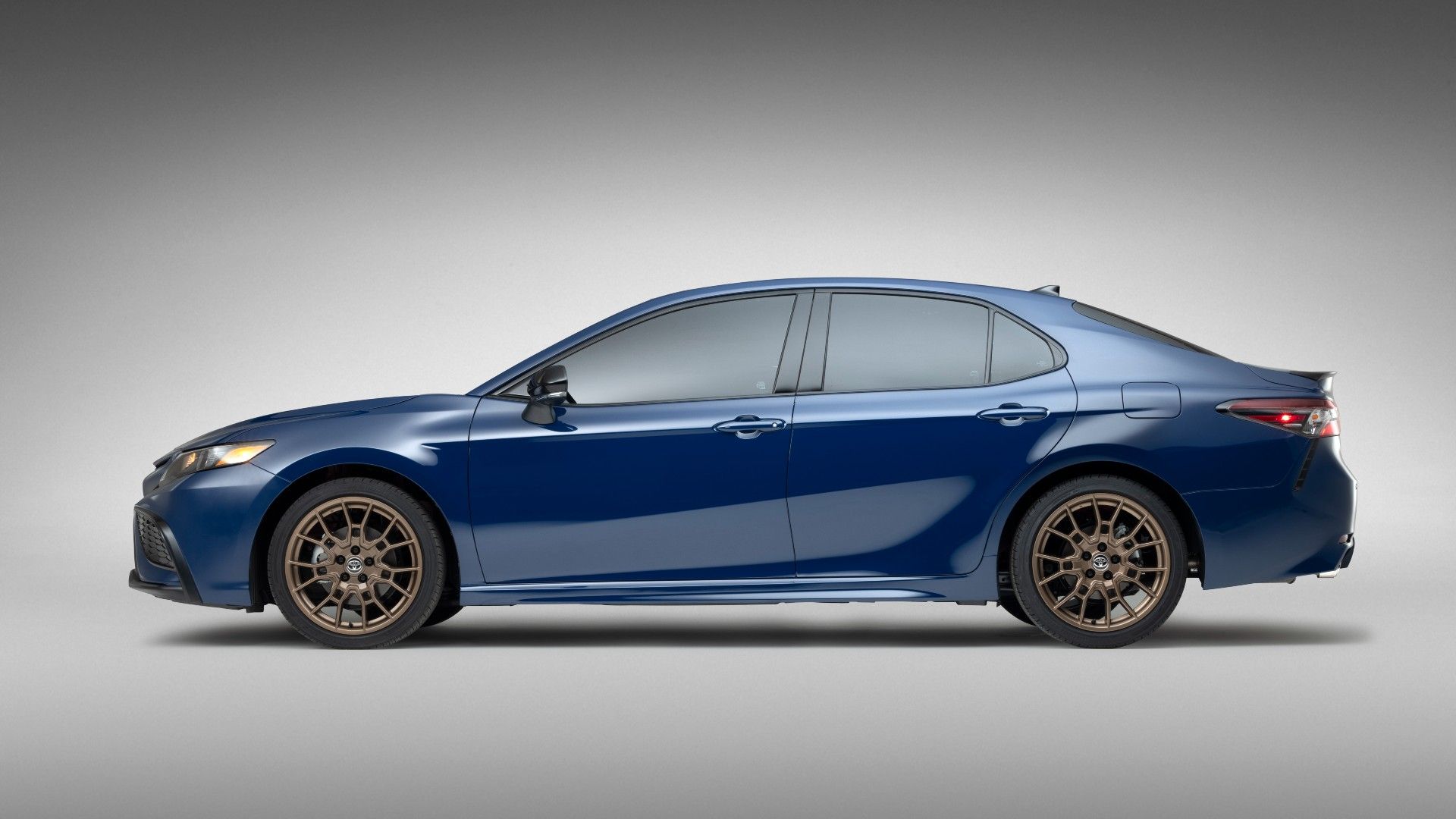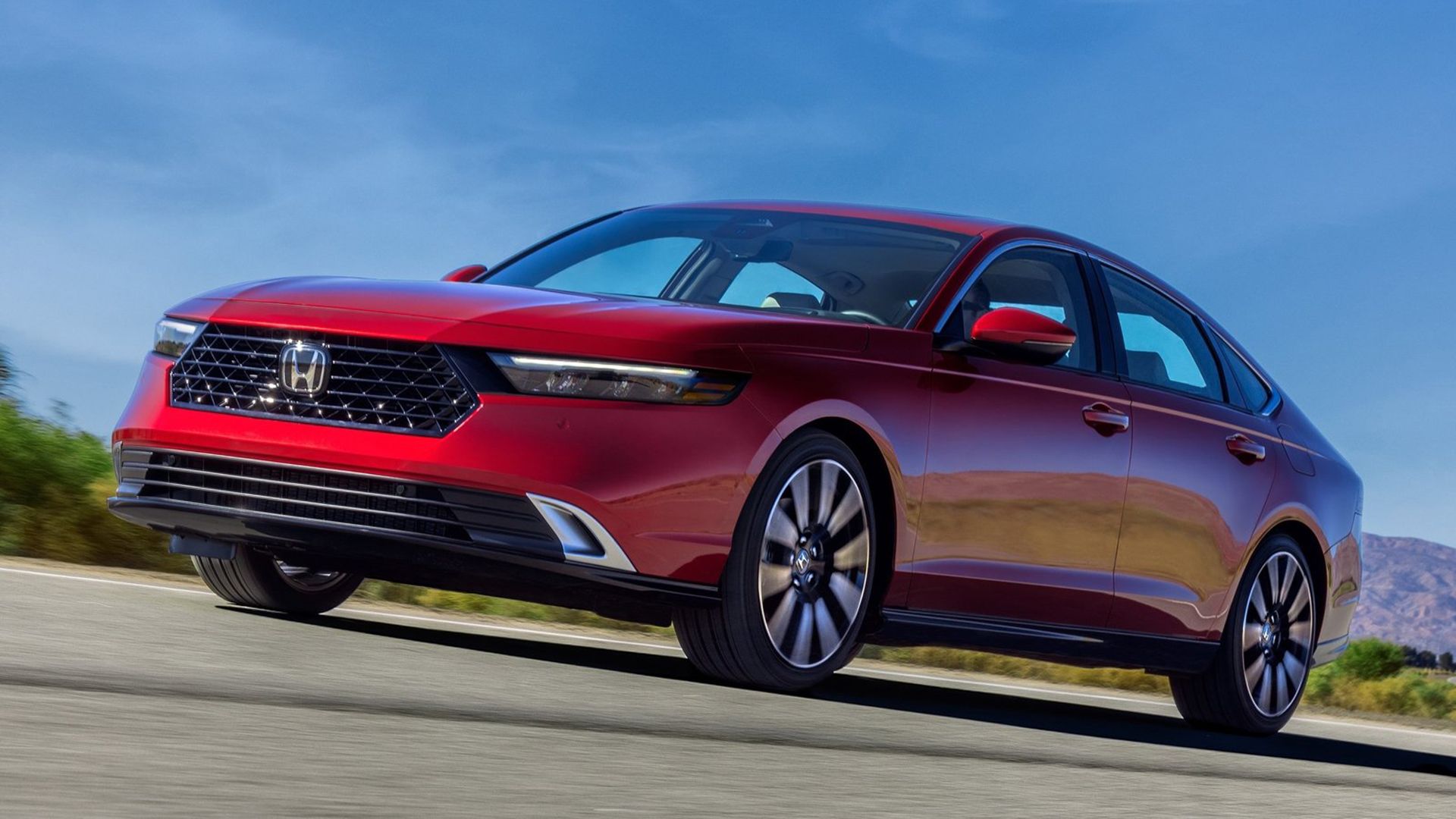Toyota isn’t all-in on fully electric cars and SUVs like many of its competitors, but the Japanese brand has long been a leader in hybrids, and the brand’s most popular sedan, the Camry, is a flagbearer of the movement. The Camry Hybrid was introduced in 2007, and over the past 16 years the model has evolved into the more efficient choice for those seeking the overall competence of the Camry nameplate.
The 2023 Camry Hybrid is in its sixth year of the current generation, and as such, it’s dated compared to some competing hybrid sedans. Toyota recently introduced its new and larger Crown, which is available solely as a hybrid; while a new Honda Accord generation was introduced for the 2023 model year. Toyota has also introduced a new Prius for 2023 that makes the once-ridiculed hybrid more compelling than ever. Despite showing its age, the Camry Hybrid continues to be a rock solid choice for those seeking an economical, practical, and affordable hybrid.
2023 Toyota Camry Hybrid Performance And Capability
2023 Toyota Camry Hybrid
Expert Opinion: There's heavy competition from the Hyudai Sonata and Honda Accord hybrids, both of which arguably offer better feature sets for the money, but Toyota's 25-year history of making hybrids help make it the best overall ownership experience.
- Model
- 2023 Camry Hybrid
- Engine:
- 2.5-Liter Four-Cylinder Hybrid
- Power Output
- 208 HP
- Torque
- 163 LB-FT
- Range
- 52 Combined MPG
- Transmission
- CVT
- Driveline
- FWD
- MSRP
- $28,355
- Toyota reliability
- Competitive base price
- 50-plus combined MPG
- Surprisingly low curb weight
- Very comfortable ride
- EV mode is low speed only
- Relatively basic interior
- Harsh 2.5-liter gas engine
- Look elsewhere for "sporty"
The 2023 Camry Hybrid is available in five trims, and all models are powered by a 2.5-liter, four-cylinder engine delivering 176 horsepower and 163 pound-feet of torque, paired with a single electric motor for a total system output of 208 horsepower. A second electric motor is used to charge the hybrid system. All models are front-wheel drive—AWD is not an option. The hybrid system pairs with a continuously variable automatic transmission. Toyota’s CVT is supposed to mimic a six-speed automatic, but suffers from the same indecisiveness as many of its rivals under hard acceleration. However, when cruising, it goes about its business with smooth power delivery. Paddle shifters are standard on SE and XSE grades.
The Camry Hybrid’s performance is about average for its segment with a 0-60 mph time of 7.4 seconds. Comfort, not performance, is at the forefront of the Camry Hybrid’s driving dynamics and in that regard, it excels. Ride quality is supple in the city, soaking up rough roads with ease. Driving is easy, with light steering that still feels connected to the front wheels. Performance from the brake-by-wire system, with 12-inch discs up front, is predictable. The Camry Hybrid is not going be the choice for many enthusiasts, although the SE and XSE model are a bit livelier with sport-tuned shocks and springs. All models make for a comfortable and relaxed commuter, although those prone to carsickness might find the base model a little too soft on undulating road surfaces.
Of course, daily driving is the Camry Hybrid’s reason for existence given its efficiency. The base LE model is rated for up to 52 combined MPG (51 city/53 highway) while upper trims return 46 combined (44 city/47 highway), according to EPA testing. That's considerably better than the Sonata Hybrid's EPA-rated 47 MPG combined, and the Accord Hybrid's 48 MPG. The most efficient non-hybrid Camry returns up to 32 combined MPG.
The Camry Hybrid is equipped with an EV Mode for all-electric driving, but the system is only usable at ultra-low speeds, like when the Toyota is traversing a parking lot. An Eco mode aids the Camry’s efficiency by limiting power output.
Exterior Styling
The 2023 Camry Hybrid looks about the same as when the current Camry generation debuted for the 2018 model year. The front fascia is highlighted by several faux and genuine intakes, including two large intakes forward of the front wheels. All sport a variation on the corporate spindle grille and sharp angles accentuating a sculpted hood. Styling is a bit more subdued in profile, though a rising character line and slightly flared rear arches provide some visual stimulation. The rear overhang is long to accommodate the Camry’s trunk, with a high trunkline that makes the backup camera a necessity.
Some styling variations exist across the Camry Hybrid lineup. For instance, base models wear a dark gray front grille, while others sport a black or metallic version. Sixteen-inch wheels are standard, while mid-range models have 18-inch units and the range-topping XSE wears 19-inch alloys.
The Nightshade trim (shown) was introduced for the 2022 Camry Hybrid and remains available for the 2023 model. Most notably, Nightshade models feature a black front grille with a “sport mesh” inlay from the performance-oriented Camry TRD, with JDM-style 19-inch, bronze alloy wheels. Other exterior features include a black rear spoiler, black mirror caps and exterior badges, and black-trimmed headlights and taillights.
Length | 192.1 in. |
|---|---|
Width | 72.4 in. |
Height | 56.9 in. |
Wheelbase | 111.2 in. |
Ground Clearance | 5.7 in. |
Curb Weight | 3,480-3,580 lbs. |
Interior Quality And Technology
The Camry Hybrid improves its prospects as a comfortable commuter or family car with a spacious and intuitively presented cabin. Seating for up to five is offered, and adults of average size won’t feel pinched in the rear seats with generous passenger space in both rows. The Camry Hybrid’s trunk accommodates 15.1 cubic feet of storage, and its deep recess, wide opening and low lift-over height makes it highly practical for hauling stuff.
A particular strong point of the Camry Hybrid is its easy-to-use layout. All controls are well within the driver’s reach with plenty of redundancies built-in with a bevy of steering wheel controls. A traditional gear lever sits closest to the passenger with driving mode buttons, and an electronic parking brake switch within easy reach. A slim but deep center console sits behind two cupholders, and a small storage area under the center stack that doubles as a wireless charging pad on upper models.
Toyota’s infotainment system will be familiar to any other Toyota driver and isn’t particularly attractive, but it is intuitive, and loads of traditional switchgear makes it easy to use. The three lower trims feature a seven-inch infotainment screen while the top two trims are equipped with a nine-inch screen, which we recommend. Climate controls and radio inputs are also easily reached and intuitive. We've never experienced an issue with infotainment in a modern Toyota, which is definitely not the case with many other makes.
The Camry’s interior is modest and serviceable even in higher trims, but there's a high feature set even in base models. A choice of five trims also gives buyers a chance to pick-n-mix their preferred flavor.
The base LE model includes dual-zone automatic climate control, power-adjustable driver’s seat, keyless entry, and cloth seats. The SE and Nightshade models don’t provide much interior improvement as the only changes in the cabin are synthetic leather-trimmed seats. Those seeking a more upscale cabin should consider the XLE, which adds leather upholstery, synthetic wood trim, rear air-conditioning vents, heated front seats, ambient interior lighting, and a wireless charging pad. The top-tier XSE includes these features plus some exterior updates like larger wheels. Optional add-ons for the XLE and XSE include a sunroof, navigation, heated steering wheel, and ventilated front seats. While the cloth interior is durable, it's not the most comfortable, and we'd go for an XLE if we were going to live with one for the long term.
Seating Capacity | 5 |
|---|---|
Headroom (front) | 38.3 in. |
Headroom (second row) | 37.6 in. |
Legroom (front) | 42.1 in. |
Legroom (second row) | 38 in. |
Shoulder room (front) | 57.7 in. |
Shoulder room (second row) | 55.7 in. |
Cargo Room | 15.1 cu.-ft. |
2023 Toyota Camry Hybrid Pricing And Availability
The 2023 Toyota Camry Hybrid is available now and starts at $28,355 MSRP with the XSE topping the range at $33,795. The base model is offered with eight optional packages adding creature comforts like heated seats and/or additional driver’s aids, while upper models have a choice of navigation-based packages that can ring in as high as $4,815 in the XSE.
Trim | Price |
|---|---|
LE | $28,355 |
SE | $29,890 |
Nightshade | $30,890 |
XLE | $33,245 |
XSE | $33,795 |
Safety
Toyota puts an emphasis on safety with impressive crash test ratings and a suite of driver’s aids as standard on the Camry. The 2023 Camry Hybrid receives a five-out-of-five-star overall crash rating from the NHTSA, with perfect scores in all categories.
Standard safety features include automatic forward emergency braking, adaptive cruise control, lane-keep assist and lane-departure alert with steering assist. The XLE and XSE models add a blind-spot monitoring system with rear cross-traffic alert. A head-up display, adaptive headlights, a surround-view camera, and rear parking sensors are available.
Main Competition
The Camry Hybrid’s main rivals are the Honda Accord Hybrid and Hyundai Sonata Hybrid, and all three models should be considered by anyone shopping for a midsize hybrid sedan.
The Camry and Sonata are separated by just a few hundred dollars in price in their base trims and offer similar amenities. The Honda costs nearly $4,000 more to start, but it comes with more generous standard features, including heated seats and a sunroof.
All three models deliver similar performance, though the Camry offers 16 more horsepower. The Camry Hybrid’s fuel economy ratings of 51-53 combined MPG lead the 45-51 combined ratings for the Sonata, while the Accord flips the numbers with 51 city, 44 highway.
The Camry Hybrid’s 15.1 cubic-foot trunk is about one cubic foot less than offered in the Hyundai, and 1.6 cubic feet less accommodating than the Honda. Passenger space is nearly a wash between the models. The Sonata offers the most front head and legroom, but has the least of the three in the rear, with Toyota in the middle and Honda with the most rear legroom.
The Sonata Hybrid’s five-year, 60,000-mile basic warranty and 10-year/100,000-mile powertrain warranty is far more appealing than the Camry Hybrid’s three-year/36,000 mile basic and five-year/60,000-mile powertrain warranty. Of course, the Camry comes with Toyota’s well-earned reputation for low maintenance costs and reliability, and if you're really concerned, you can buy Toyota's extended 10-year Platinum warranty for around $1,000 (depending on the dealership), and the hybrid components have their own eight-year/100,000-mile warranty.
Ultimately, the Accord Hybrid, Sonata Hybrid, and Camry Hybrid are all solid choices for efficient midsize sedans. With much of their specs lining up on paper, factors like styling, intuitiveness, overall comfort, and other objective factors will likely play the deciding factor in which model is best for individual buyers. If long-term cost to own is your main factor, then the Camry Hybrid is a clear winner.
FAQ
Q: How much is the 2023 Toyota Camry Hybrid?
The 2023 Toyota Camry Hybrid starts at $28,355 MSRP with the XSE topping the range at $33,795.
Q: How many miles per gallon does a 2023 Toyota Camry Hybrid get?
The 2023 Camry Hybrid returns up to 51 combined mpg.
Q: What is the price of Toyota Camry Hybrid?
The 2023 Toyota Camry Hybrid is available now and starts at $28,355 MSRP
Q: What are the changes in the 2023 Toyota Camry Hybrid?
The Camry Hybrid remains relatively unchanged for 2023, though the Nightshade Edition receives a few minor styling updates.






